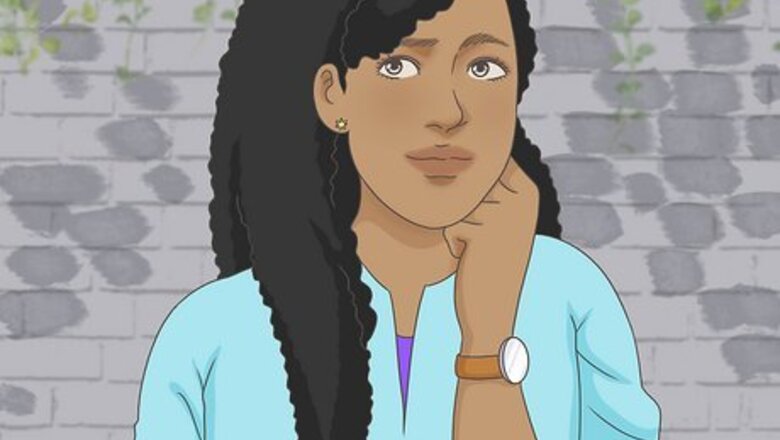
views
Maturing Emotionally from a Girl to a Woman
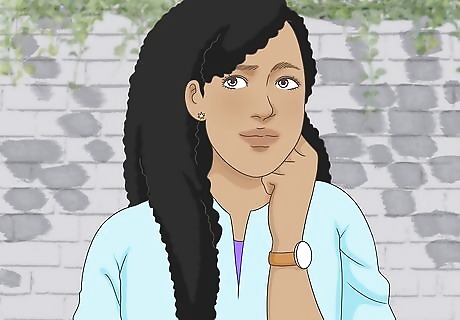
Tell yourself that being a woman is a mindset. Being a woman is not just about the body you are developing: it also has to do with the way you think and feel about yourself. It might take a lot of time and hard work before you feel like a true woman, but there are steps you can take to make the transition.

Read coming-of-age books by and about women. The world is constantly changing, and there are a lot of things to learn. Consider purchasing or checking out of the library books that can help orient you to the world of womanhood. Pay attention to the memoirs and autobiographies of women you respect.You will be exposed to the challenges they faced, which will help you confront your own challenges.

Learn appropriate social skills and behaviors. If you act like an adult, not only will you be treated like an adult but you will also have higher self-esteem. Some key steps you can take include: Avoiding procrastination. Take responsibility for your commitments, and complete your tasks in a timely way. Having good manners. Behaving in a kind and polite way can help set the stage for a responsible adulthood. Standing up for yourself. Politeness is important, but it does not mean that you should be walked all over. Learn how to express your views with confidence, even if the people around you are not behaving as politely as you are.

Act with confidence. While women tend to underestimate their abilities, men tend to overestimate their abilities. This is known as the "confidence gap." Keep this in mind as you enter adulthood: even if you feel nervous about a task, you might very well be the most competent person in the room. Some ways you can overcome the confidence gap include: Seeking out female role models. Find women in leadership positions who can help you learn leadership skills of your own, such as how to speak with confidence, how to supervise a team, and how to engage in constructive criticism. Not letting your "niceness" keep you down. Kindness and politeness are important skills for adulthood, but women are often told to be nice and polite at the expense of their knowledge and expertise. Try to find a good balance between acting kindly and sticking to your guns. Speaking confidently. Practice speaking to others with power and confidence. Stand up straight, project your voice, keep eye contact with your listeners, and speak in definitive tones. Resist the urge to make your definitive statements sound like you are asking questions or asking for permission ("uptalk"). Passing it on. Just as young women depend on other women for leadership skills, you have the potential to be a key role model for younger generations too. Pass along your unique knowledge and skill sets to a younger woman who could benefit from it, and continue to hone your leadership skills.
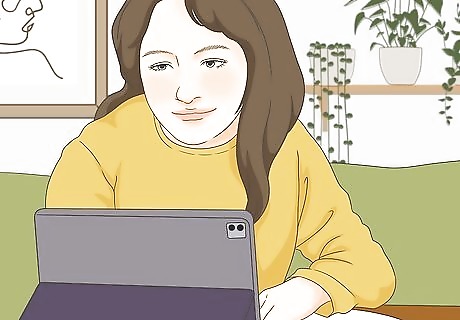
Learn about the world. Being up-to-date about important current events and news items is a great way for you to appear knowledgeable and responsible. You will have lots of material for adult conversations and will also begin to learn about your place in a much larger world. This can also help you decide what your values are as you enter the world of adulthood. Consider: Reading, watching, or listening to the news regularly. Find journalists you respect and follow their stories. Read well-researched nonfiction books about topics you care about. Make your own conclusions. While you will have to get your information from other sources at first, eventually you will be able to analyze events on your own. If you are old enough to vote, you can vote for the candidates and policies that align most closely with your own. If not, you can find other ways to get involved, such as by writing, signing petitions, or volunteering with organizations you care about.
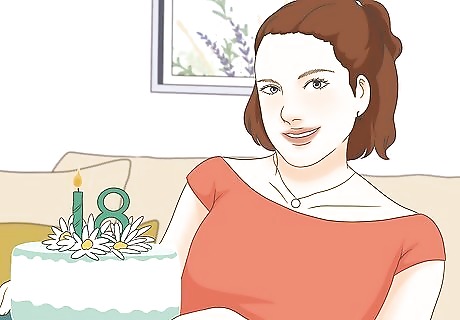
Take part in a coming-of-age ritual. Most cultures have some kind of important ceremonial marker to designate when a boy becomes a man or when a girl becomes a woman. These rituals can help make a young person feel like an adult and a full-fledged member of a community. Whether it is a Sweet 16 party, a Quinceanera, or a Ji Li, these rituals serve as a significant turning point in the life of a young woman. Depending on what culture you identify with, you might want to plan a coming-of-age ritual or party to mark the beginning of your life as a woman and to bid farewell to your girlhood.

Make goals for yourself and live up to them. It is important to set independent goals for what you want your life path to look like. These goals might be different from your parents' goals and they might be influenced by your friends and peers instead. You might even set goals that are completely different from those in your family or peer group. Perhaps the most important marker of a mature woman is that she lives according to her decisions and values. Think carefully about what you want out of life, and make a plan to live up to those goals.
Developing Skills for the World of Womanhood
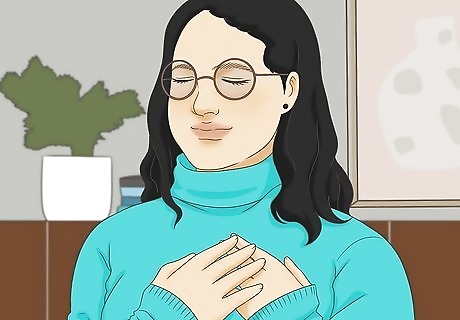
Tell yourself that being a woman is more than a physical thing. Being a woman also involves maturing emotionally, psychologically, and behaviorally. Most importantly: you will have to learn how to be independent. This will involve learning new skills and habits that will pave a pathway toward success as an adult.

Research the skills you want to build. There are a lot of things to learn. You might not be able to learn them all right away, but these life skills will allow you to carve your own path through the world without relying on anybody else. Consider purchasing or checking out of the library books that can help orient you to the world of womanhood. Pay attention to how-to guides to help you learn valuable skills. The internet, your friends, and trusted adult mentors are also great resources for learning the skills you will need to be an independent woman.
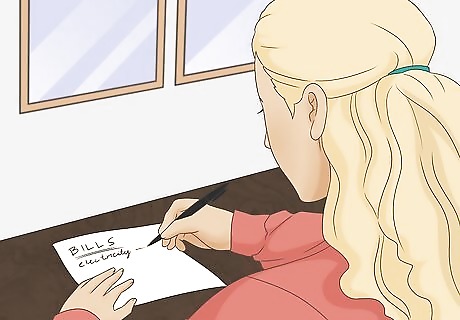
Manage your finances. Financial responsibility is important as you mature from a girl into a woman. Perhaps you are working in your first job, preparing to pay for college, or thinking about moving out of your parents' home. In all these cases you will have to learn important life skills such as: Balancing your checkbook. Keeping careful track of your income and expenses. Paying your taxes in a timely way. Saving up for large purchases and to create a safety net. Learning when it makes sense to take on debt, and when it does not make sense.

Figure out transportation. One way to become a more independent young woman is to figure out how to get from Point A to Point B without depending on your parents. Depending on how old you are and where you live, you might inquire about getting your driver's license or learning permit. Otherwise you can look into public transportation options so that you can travel freely to school, work, and other locations.
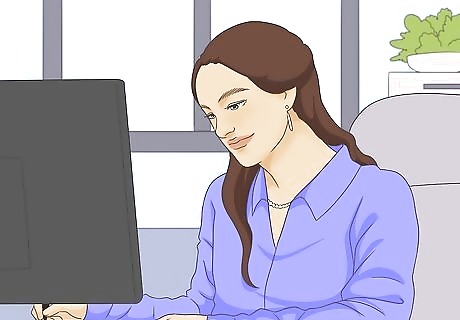
Learn job skills. Being able to keep your commitments, show up on time, take responsibility for your actions, and respond appropriately to criticism will all serve you well in your life as a woman, especially if you work in a career. Finding and keeping a job will allow you to learn how to be independent and will also give you some financial freedom as you mature into womanhood.
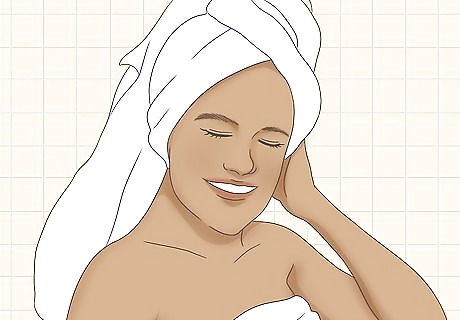
Take care of personal hygiene and your appearance. As your body develops, your body will have different requirements for appearing put-together and healthy. For example, you might have to shower more often than you did when you were a girl, and you might want to use different products to clean your face now that it is more acne-prone. Other things to keep in mind are: Keeping your hair tidy. Whether your hair is long or short, straight or curly, you will want to find ways to keep your hair from appearing messy. Perhaps you will put your hair up into a bun, find a short cut that you can maintain easily, or trim your split ends frequently. Taking care of your clothing. Make sure that your clothing fits and that you are taking care that your clothes are clean, wrinkle-free, and in good shape. Always dress up in clothes that fit well. Wearing accessories. Some women like to wear jewelry and make-up; others do not. If you choose to wear accessories, make sure they are age-appropriate, adhere to dress codes for work or school, and that you are not allergic to them. For example, a bright pink unicorn necklace might have been appropriate when you were a girl in school, but will likely be frowned upon at your new job at a local bank. Consider a simple gold necklace instead.
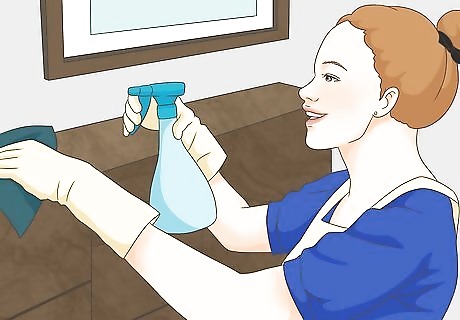
Take care of your living space. Whether you live with your parents, siblings, roommates, or by yourself, you will need to take more responsibility for the place where you live. As a child, perhaps you could let things slide, but adulthood brings with it more responsibility. This means cleaning up any messes you make, vacuuming and sweeping regularly, and making sure common areas (such as bathrooms or kitchens) are cleaned regularly.
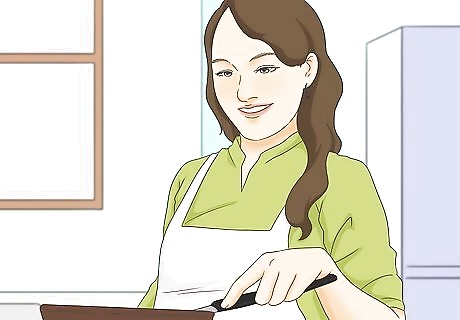
Learn how to feed yourself. Figuring out how to prepare healthy snacks and meals for yourself will help you mature into a healthy, happy woman. You might not be able to rely on anybody else to do your shopping, so you will have to learn how to meal plan, make a grocery list, purchase healthy and nutritious ingredients, and prepare them appropriately. Prepare to make a lot of mistakes as you learn how to cook, but remember that these mistakes are all educational.
Maturing Physically From a Girl to a Woman
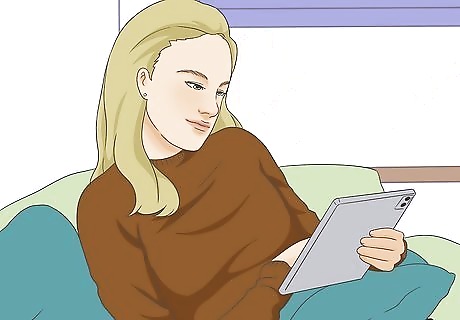
Read about the effects of puberty. Puberty is the phase of biological development when a child's body transforms into an adult body. Puberty will lead to a number of physical and emotional changes in a girl as she develops into a woman. In girls, puberty usually begins between the ages of 8 and 13 and can last for as long as 6 years. It is important that you understand what kinds of changes to expect, so that you are not shocked or scared by how your body is transforming. Typical changes during puberty include: Growing taller and going through growth spurts. Developing hips and breasts. Hip and breast soreness and tenderness are typical during this period. Growing underarm and pubic hair. Sweating more profusely. Developing acne and other skin changes. Beginning to menstruate. Experiencing mood changes and mood swings. Note that if you have not started menstruating by the time you are 14 years old, you should talk to your doctor to make sure everything is developing properly.
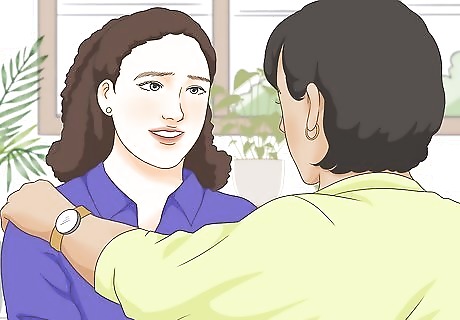
Ask a mentor about the physical changes caused by puberty. Every woman goes through puberty differently, and many women have different preferences about how they would like to handle these changes. Still, there are steps you can take to make the maturation process smoother and less stressful. One important step is talking to a trusted adult woman--who could be a family member or not--about how to react to your changing body and shifting emotions. She can serve as an important mentor during this time in your life. Not only can you benefit from hearing stories about her own maturation process, but she might be able to help guide you as you prepare for the development of your adult body.
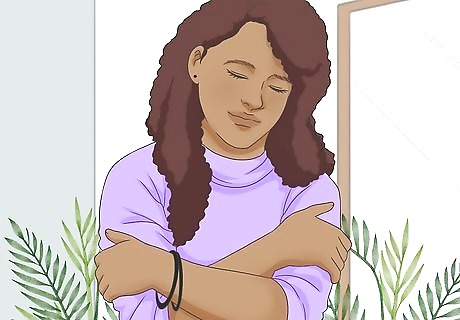
Learn to embrace your changing body. The years when you mature into a woman can be exciting, but also daunting. Many girls become stressed out because of weight gain, skin changes, new curves, and sudden growth spurts. Between 50% and 88% of young women report negative feelings about their bodies during this vulnerable period of time. Try to engage in body-positive activities so that you are not trapped in negative thoughts. For example: Tell yourself that media portrayals are not accurate. It can be easy to compare yourself negatively to the models and actors you see in the media. Remember that models and celebrities are not the norm. Keep in mind that special effects, make-up teams, professional lighting techniques, and airbrushing are all used to change the appearance of celebrities. If necessary, avoid unrealistic media portrayals of girls and women: turn off the television, close the fashion magazine, and spend some time with your friends instead. Compliment yourself. Even if puberty is bringing unwanted changes (such as acne), perhaps there are things that you like about your new body. Do you like being taller? Feeling more adult? Having curves? Look at yourself in the mirror, and give yourself compliments. You should feel proud of how you've grown. Compliment your friends. Remember that your friends are probably experiencing negative or uncertain thoughts about their bodies, just like you. Tell your friends all the things you appreciate about them, and help boost their self-esteem. Maintain healthy eating and exercise habits. Many young women are tempted to go on extreme crash diets or exercise too often in response to their changing bodies. However, gaining body weight, increasing body fat, and growing rounder are normal, healthy changes to a developing body. Resist the temptation to go into extremes and instead follow common-sense rules about diet and exercise. Always eat nutritious food when you are hungry, and never starve yourself. Talk to your doctor about concerns about your body. If you feel like something is not right with your body, talk to your doctor. Your doctor will be able to help you decide whether the change is normal and healthy. Cognitive Behavioral Therapy (or CBT) has been shown to be an effective treatment for those who develop a negative body image. If you experience persistent negative thoughts about your body image, talk to a doctor or counselor. You don't have to live with these thoughts, and you can feel happier and more confident with proper treatment.
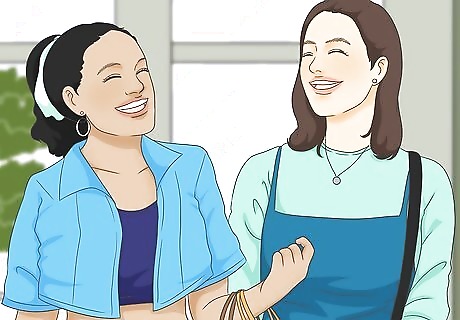
Go shopping with a friend or your mentor. Some of the physical changes caused by puberty will require that you purchase new clothing or supplies in order to stay comfortable in your body. You might have to go on several different shopping sprees as you go through different stages of puberty. It might also take you a while before you discover what products you like the best. Having a friend or mentor help you shop will make the process easier. Everyone has different preferences, but in general you can expect to shop for the following items: When you notice yourself sweating more, you can begin to shop for deodorants (which mask body odor) and antiperspirants (which reduce the amount of underarm sweating). When you notice that your breasts are growing and becoming sore, you can shop for training bras and bras. These items will provide you with support and coverage. When you notice your body hair growing or darkening, you might want to purchase razors or waxing kits. Not everyone wants to get rid of her body hair, however: decide what is right for you! When you begin to menstruate, you can begin to purchase tampons or maxi pads in order to protect your clothing from stains. If you experience unwanted acne, you can purchase over-the-counter medication and face washes to help. You can also talk to your doctor about prescription medications that might be stronger. When you find yourself growing taller and curvier, you can shop for new clothing, either in the Juniors' or the Women's section of clothing stores. Because you are growing quickly, you might grow out of your old clothing at a rate faster than what you are used to. You can consider shopping at a thrift store in order to keep your costs down as you explore what it means to dress a woman's body and find your own unique style.
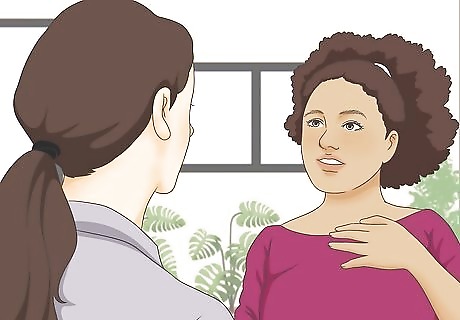
Take care of your sexual health by seeing a gynecologist. During and after puberty, a girl has the potential to become pregnant. This can be a huge and daunting responsibility. You will also need to take care of your sexual health. Teenage girls should begin seeing a gynecologist, who can provide advice about birth control, knowledge about the prevention of sexually transmitted illnesses, cancer screenings, and other ways to keep a woman's body healthy.

Recognize that it doesn't all have to happen right away. The average woman claims to reach emotional maturity at the age of 32. (For men, the age is 43.)You have lots of time to grow and change: you do not become a woman overnight. It is a long and gradual process. Brains aren't even fully developed until the age of 25. Try to enjoy this journey to womanhood, even if it takes a long time.














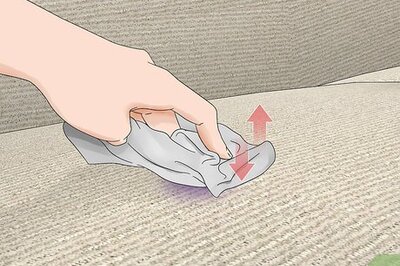

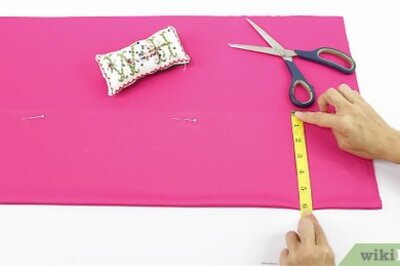
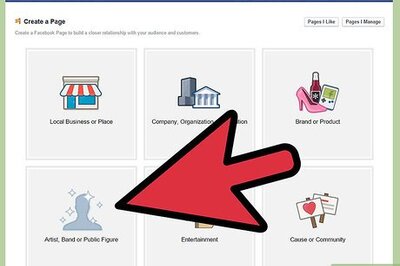
Comments
0 comment